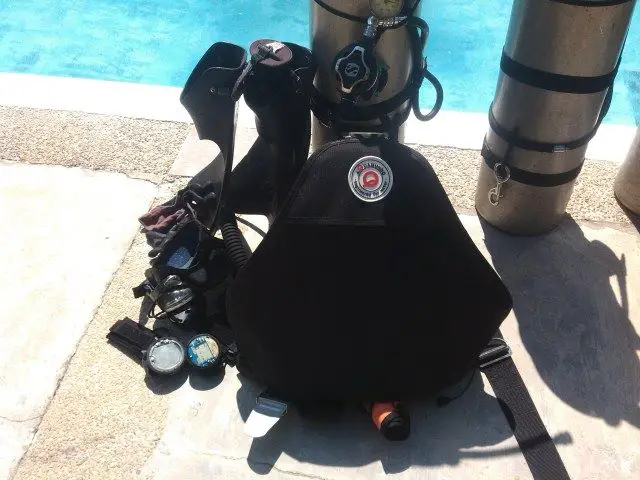Most scuba divers want to own their dive kit instead of renting all the time. There are many advantages to owning, and it just feels nice to have dive gear you can call your own. But, let’s face it – you were thinking about getting some shiny new equipment that’ll lose a sizable percentage of its value the second it touches water – weren’t you? Not that there’s anything wrong with buying new, but if your budget is tight, then you owe it to yourself to at least consider buying used scuba gear instead.
Should you buy used scuba gear? You should definitely consider it. With websites like eBay, Craigslist, and Facebook Marketplace, buying and selling used scuba gear has never been easier. With a bit of research and some back and forth with the buyer, you can get yourself a full set of scuba gear for 30-50% less than the store price. That said, buying used scuba gear does put you at risk of receiving a dud with no guarantee of a refund. There are ways to protect yourself so that you can minimize this risk.
The second hand market is the ultimate way to recycle perfectly usable scuba gear. It’s also amazing for discounts if you know where to look and how to buy. Buying new is not always the best option; renting is fine, but so is buying second hand. In this article, we will discuss best practices when buying used scuba gear and why it might be the right option for you.
Shiny new scuba gear vs. old dive gear
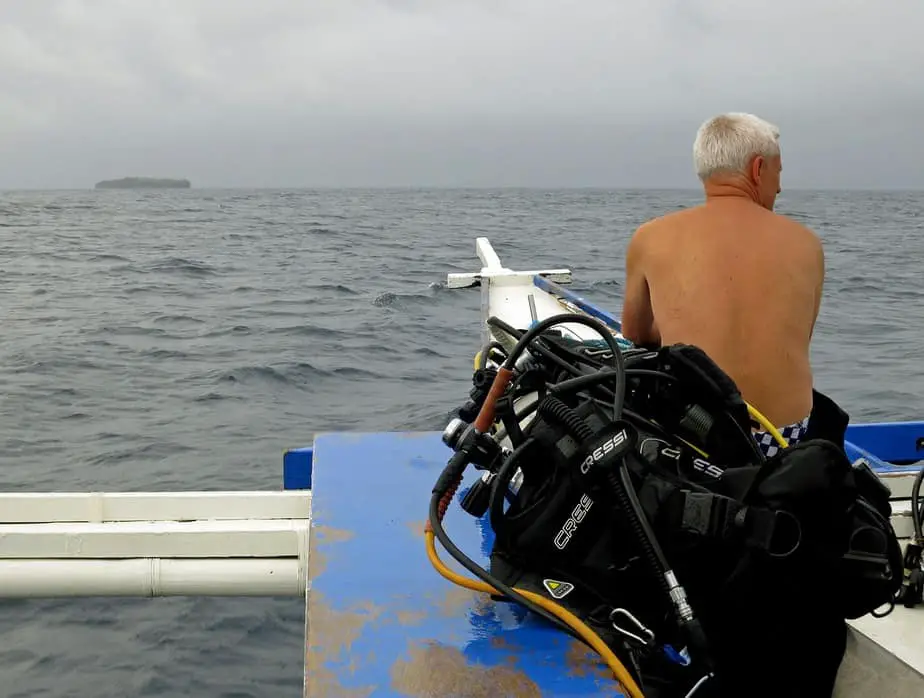
It feels nice to buy brand new; to know that it is unblemished, and no one else has used it before you. Buying new, you get the peace of mind that the item will be perfectly functional and backed with a warranty so if it breaks, you can get a replacement, and if it doesn’t fit, you can refund it.
Additionally, you know that new gear has been serviced recently and that you don’t have to worry about that for a few years. If money were no object, who wouldn’t want to get everything brand new?
In comparison, second hand gear has, by definition, already been used by someone. You don’t know how hygienic they were, if they took good care of the equipment, or if it has been serviced recently. In fact, you might even be buying a dud from a deceptive seller. But hey, at least it’s cheap, right?
Is it safe to buy used scuba gear?
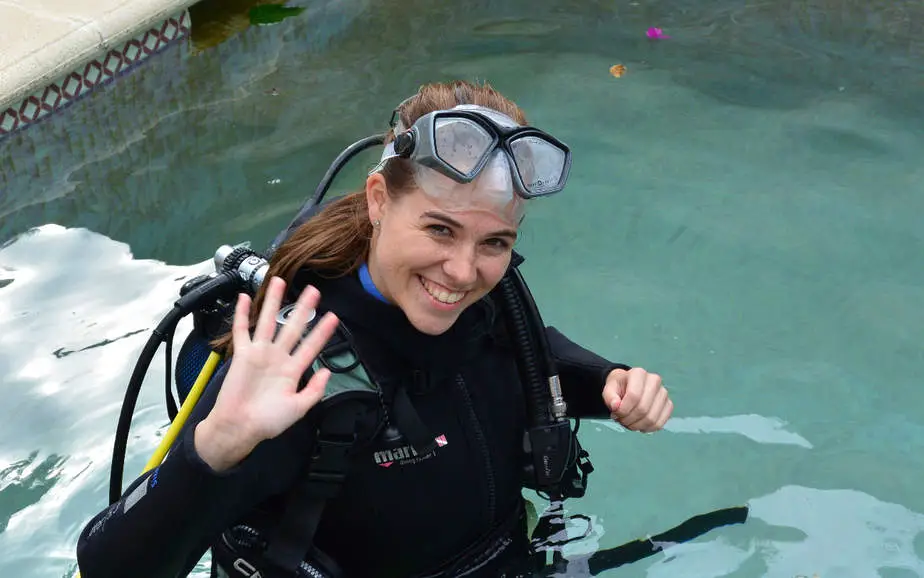
Buying used scuba gear has its risks, but there are ways to mitigate those risks. For instance, you need to contact the seller, ask questions, and meet in person to inspect the equipment yourself. Plus, when you purchase through PayPal or a credit card, you can ask for a refund if you didn’t receive what you were expecting; they almost always side with the buyer (i.e. you). If you pay with cash, you don’t have the same protection.
Horror stories are actually few and far between. The most common outcome is that you purchase an item at a significant discount that is nearly in mint condition from someone who realized they don’t like scuba diving as much as they thought. They get to recoup some of their costs, and you get a discount; it’s a win-win for all parties involved.
Even if the item you’re buying has clearly been used a lot, such as a scuba tank or regulator, that just means you can negotiate an even better price. If the gear hasn’t been serviced recently, then you can use that as a bargaining chip. Or you can just choose to only buy used gear that has been serviced recently.
We’ll be going over in more detail how to buy used scuba gear safely in a different section below. But, in answer to the question is it safe to buy used scuba gear, the answer is: Yes it is. However, you will need to do your research and ask the right questions, or you might be in for a nasty surprise.
Why you should buy second hand dive gear
Save money

Why would anyone buy used if not to save money? The expectation is that you spend less but you get an item of reduced quality. However, this isn’t always the case. Yes, it’s possible you end up buying a dud; hopefully you can issue a chargeback if that’s the case.
However, in some cases, you can buy an item that is practically brand new for significantly cheaper than its retail price. This can be equal parts luck and skill – skill in discerning which items are still in good condition, and luck for finding it in the first place.
You can buy used scuba gear from dive shops and this is a safer bet, but it usually means the price will still be on the higher end.
For the best deals on second hand dive gear, you’re going to have to buy from the average joe trying to sell their gear on eBay, Craigslist, and Facebook Marketplace, or at a garage sale or flea market.
Here is where you will need to have a keen eye for quality equipment, and a command of the spoken language that lets you negotiate a better price than what they are offering. Dive shops won’t let you haggle, but elsewhere, it’s fair game.
For instance, if you notice any defects, don’t hesitate to point them out. If the gear hasn’t been serviced recently, subtract the estimated price of servicing it from the sale price and use that as a counteroffer. If you notice significant wear and tear, such as Velcro or neoprene that has been worn thin, it might be better to just walk away because it might just be trash you don’t want.
The amount of money you can save is in direct proportion to how well you can haggle and find listings that are underpriced. Ironically, you need to be quite a skilled diver to maximize savings buying used, but everyone has to start somewhere.
Learn what gear you really want
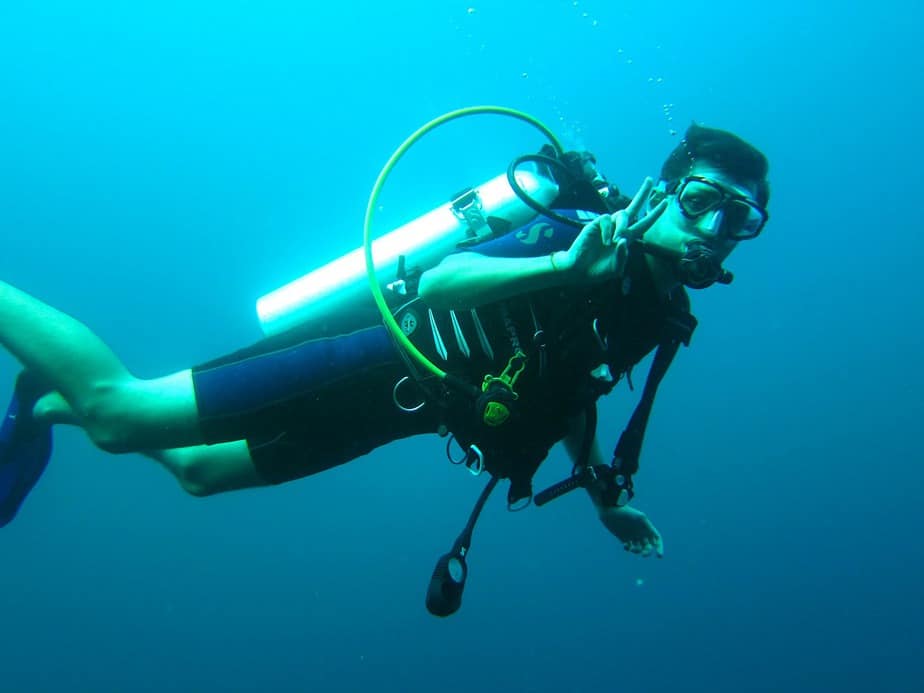
There’s nothing wrong with a dive student/new diver buying used gear or even renting their gear. Why spend more money than you need to on gear that you will outgrow quickly? As you learn more about this sport, you will start to understand what to look for in scuba gear and also what your preferences are.
All you need to start out are basic gear with no special functionality or extra features. For that, you shouldn’t have to pay full price; rent or buy used. This gives you the opportunity to understand how to size your gear, figure out what’s comfortable, and find out if there are any features you really want (e.g. integrated weight pockets in a BCD, frameless masks, larger logbook memory in a dive computer, etc).
After you’ve had enough of your used scuba gear, you can then replace it with gear that has all of these features that you want. It’s up to you whether you want to buy new or used this time around, but buying used starting out will save you a lot of money.
Gain experience about the buying and selling process
Once you’ve had some experience buying second hand gear, you will begin to score better deals by negotiating better prices. This will start to feel like a superpower. You can use this “power” to basically get a permanent discount on all scuba gear.
For instance, you can choose to buy something used, or you can buy new and sell it when you want to upgrade. The outcome is that you never truly pay full price for a piece of scuba equipment. That said, buying new and selling when you’re done is a bit of a gamble because you cannot guarantee that your gear will sell.
Thus, if buying new, you have to consider items with excellent resale value like scuba tanks, regulators or dive computers, and less on items made of neoprene that require a tight fit such as a wetsuit, fins, or dive hood which may not fetch as high of a price, if it sells at all.
How to buy used scuba gear: top tips
Try not to buy from a rental shop

In our experience, used gear found in rental shops are more likely to have been abused by their owners before it was returned. People who are trying to make a private sale tend to treat their gear better because they are clearly confident they can fetch a higher price selling it themselves.
One exception is if you can find used gear at a dive shop that is less than a year old. This means that it’s not yet time to service it again, so you can use it pretty much right away. Items that are past its service date cannot be used until you get it serviced, which adds to the cost. Unless you can get a deal on services for the equipment, the price is unlikely to be better than what’s offered in a private sale if you’re willing to negotiate.
Talk to the seller
An advantage of a private sale is that you can negotiate. Talk to the owner and find out the history of the item. How many dives has the seller used it on? What kind of conditions was the item used in? If pictures are sparse, ask for more pictures at different angles so you can see its condition better.
When you are buying from Facebook Marketplace or Craigslist, the expectation is that you can schedule a meeting so you can assess the gear. It’s not an unreasonable request given that dive gear is life-support equipment. You do not want it to fail on you when you’re 100 ft underwater, so if the seller refuses to let you do an inspection, then walk away. You rarely get an opportunity to talk candidly with the seller and inspect the equipment like this in second hand shops.
Wetsuits and other neoprene gear are generally not a good buy
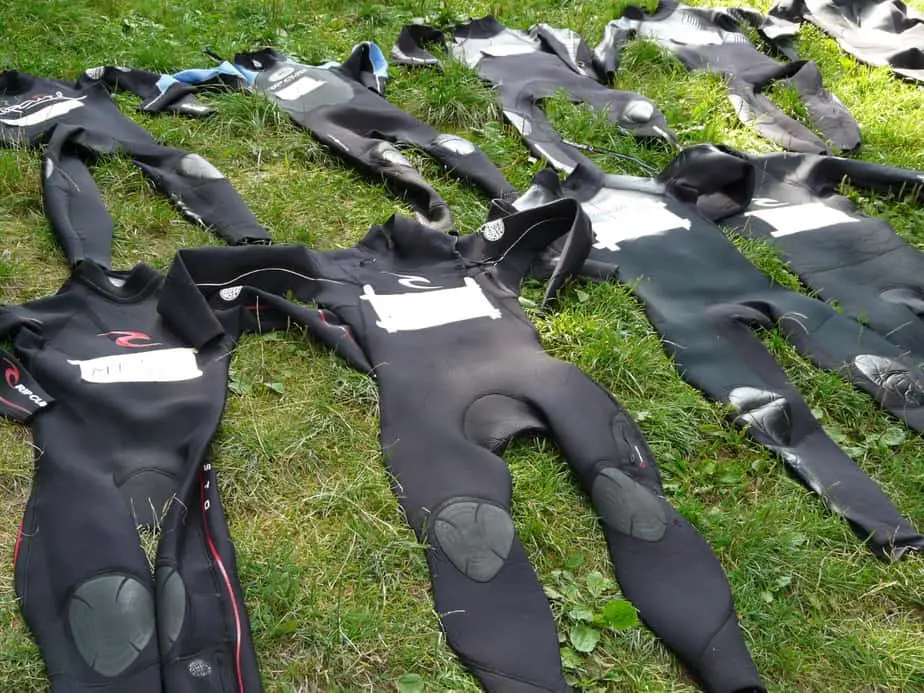
Wetsuits are one of the most common items you’ll see for sale, and it’s a common trap for beginners to fall into. See, wetsuits are not just used for scuba diving; various water sports use it as well.
For example, you’ll find that a scuba wetsuit is slightly different from a surfing wetsuit. A surfing wetsuit is designed to be more flexible, whereas a scuba diving wetsuit is designed to be thicker and more insulating, but at the cost of mobility. If you’re not warm while scuba diving, it’s possible you’re wearing the wrong kind of wetsuit.
Next, a wetsuit must fit properly in order to be effective. It needs to fit snug without restricting blood flow or making it hard to breathe. It’s hard to get the perfect fit, and plus, the resale value of a wetsuit isn’t very good because neoprene can wear down over time.
From being improperly hung using a thin wire hanger instead of a wetsuit hanger, to being folded until it has a permanent crease, to being flatted from having items placed on it, wetsuits are easily damaged.
With the odds stacked against you, I would say don’t bother buying a used wetsuit.
Make sure the gear is still serviceable
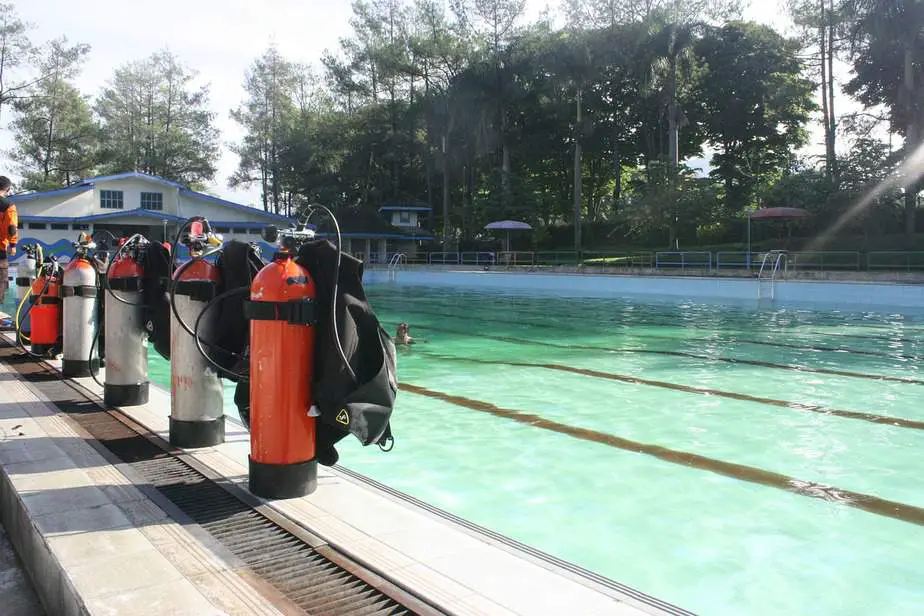
This tip applies to buying a used regulator, BCD, and used scuba tank. These pieces are crucial because they are life-support equipment, which is why they require yearly servicing. You do not want to spend money on gear that is unserviceable because then it wouldn’t be safe to use them, ever.
Therefore, this is one of the first things to ask the seller if they haven’t provided that information already. If the gear hasn’t been serviced recently, then you can try to negotiate a better price knowing that you will have to spend more money servicing it soon after buying. Heck, you should probably get it serviced anyways just to be sure that it’s safe to use.
If the seller doesn’t know, ask to take the item to a dive shop so you can ask about the availability of parts and get an estimate on the amount of service it needs or will need.
Be willing to buy new
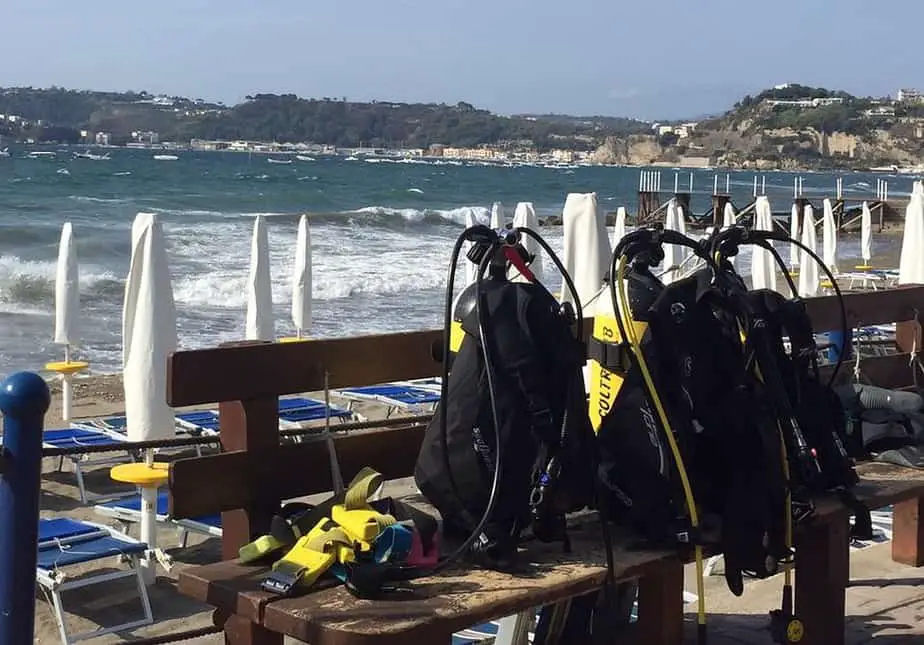
In some cases, it may be better to buy new over second-hand gear. Most manufacturers will offer a “parts for life” policy which is a guarantee that if you buy an item that requires yearly servicing, such as regulators, that you can get access to replacement parts. However, buying used voids this warranty.
The amount of savings you might get buying used will quickly be offset by the fact that you will need to spend money on labor and parts when getting it serviced. As we mentioned, if you need to immediately get it serviced after buying, are you factoring that in when buying used?
Depending on the quality of the item you’re buying, it might be better to just buy a brand new item instead. That way, you can be sure that it doesn’t need to get serviced right away, and depending on how well you take care of it, it may not actually cost much more if it doesn’t require much servicing.
Remember that your life is on the line
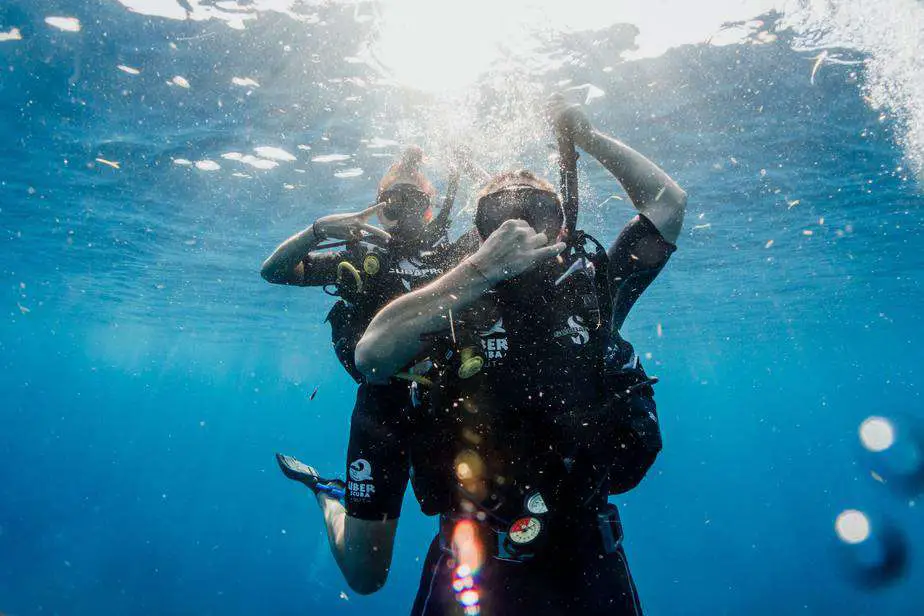
Expanding on the two points above, keep in mind that you’re buying life-support equipment. You rely heavily on the regulator, tank, and BCD to stay alive while scuba diving. Saving a few bucks feels nice in the short term, but if it jeopardizes your safety, it is most assuredly not worth it.
Any time you feel uncomfortable about the quality of the item you’re purchasing, just walk away. If the seller can’t seem to answer your questions regarding how long it’s been used for, has it been serviced recently, etc., walk away. If the price seems too good to be true, it’s almost assuredly a scam. Walk away. You need to be confident that your gear can keep you alive. No deal is good enough to compromise on safety. Thus, be willing to buy new, and make sure the gear is serviceable if buying used.
Parting words
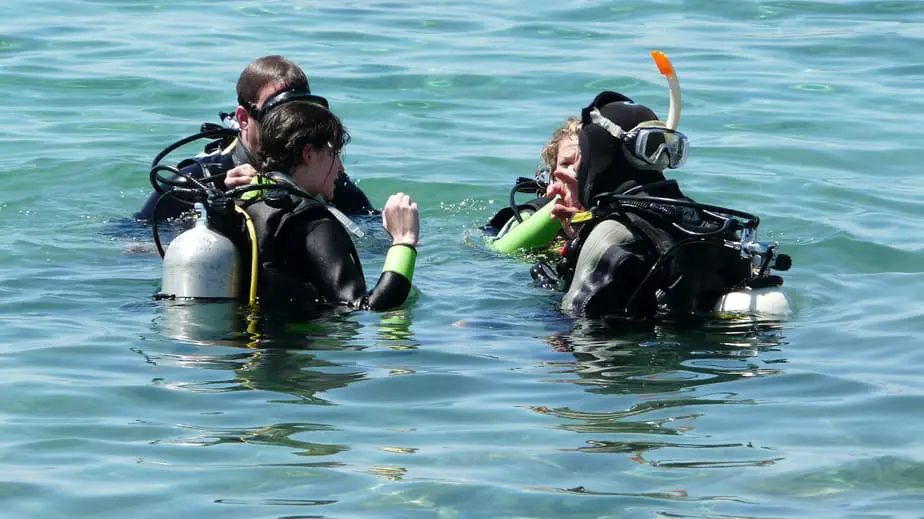
Buying second hand dive gear is a viable option for divers who are looking to get a sizable discount on usable or even great gear, assuming you have done your homework. Remember, there are no guarantees until you can inspect the gear in person and talk to the seller. So how can you reduce your chances of buying a dud and get high quality scuba gear for cheap?
Here are some nuggets of wisdom to keep in mind:
- Ask the seller about how much they used the equipment they’re selling and in what kinds of conditions did they typically dive in. Ideally, you want to hear something like they used it only a handful of times while doing recreational diving in a tropical destination, and they are selling it because they dive so rarely. This is a good sign that the item is still in good condition since it’s barely been used.
- Find out if the seller is an active diver or not. If so, there is a higher likelihood that the seller has taken good care of their gear and maybe had it serviced a few times as well. They know the importance of dive gear and are less likely to mislead you.
- If buying from eBay or Amazon where the item is simply shipped to you, try to purchase with a credit card or with PayPal. There are many buyer protections in place, the most powerful of which is a chargeback if you didn’t receive the item or it was not as advertised.
- If the site you’re buying from has ratings, check that the seller has mostly positive ratings and how long they’ve been in business for.
- When buying a BCD, pay attention to how worn out the Velcro is as this is a good indicator of how much it has been used.
- You should service all second-hand regulators immediately after buying, so factor that into the cost.
- When testing a BCD, fully inflate the bladders until the dump valves release, then leave it inflated to see if it leaks.
- Rinse the gear in warm water and see if you can smell any chlorine. If you can, then that means the gear has not been properly cared for, and it may not last as long unfortunately. We recommend testing your equipment first in the pool before taking it out for a real dive.
If you think that following all of these tips in order to not buy a dud is annoying, then fair enough, you are probably not the type of person who should buy used. We do feel that most of it are things you should know whether you’re buying new or used just to get a feel for the condition of your gear in general.
However, we can understand not wanting to deal with the hassle of going through dozens or possibly hundreds of listings and having to contact multiple sellers to meet up and do an inspection and so on. Time is money as they say, so if you have the disposable income, then just buy brand new and save time.
That said, learning how to buy or sell used gear is a great skill to have not just for scuba diving, but life in general. Imagine being able to get a discount on all big purchases knowing that you are buying used, or buying new but selling it down the line to recoup some of the costs. If this concept appeals to you, then you can and should buy used scuba gear.
Photo Credits: Devondiver, CC BY-SA 4.0

